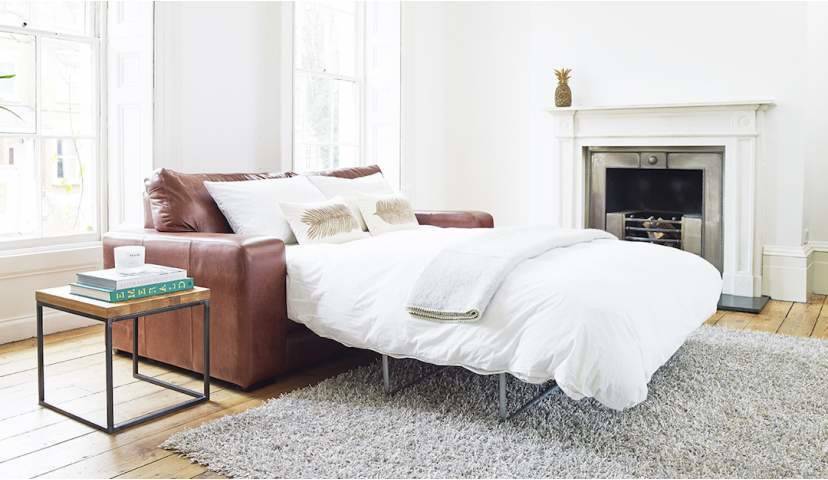Sofa Bed Shootout
These days most of us live in much smaller properties than previous generations and, with space at such a premium, living rooms and studies tend to double up as bedrooms when we have guests to stay. It’s no wonder, then, that there is an ever-expanding range of different options for temporary and foldaway beds. In this blog post, we see how all the options stack up against a classic or corner sofa bed.
Sofa bed vs Murphy bed
What is it? A Murphy bed is a bed that folds down from the wall. In the down position, it is more or less an ordinary bed, except that it is connected to the wall with hinges and levers that allow it to be raised up and pushed flat against the wall when not in use. Many are placed with cupboards or shelves on either side to provide a recess in which the bed can rest when folded up. These kinds of beds can even have false cupboard doors on the bottom so they are completely disguised when not in use, or else they can be built into a cupboard which can be closed when they are folded up.
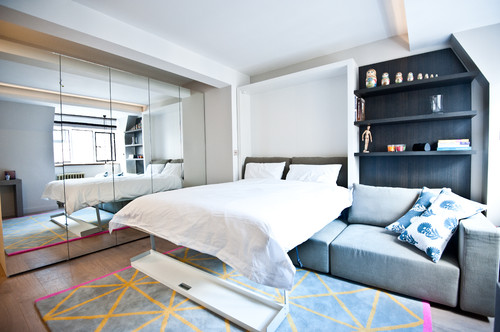
The advantages? One of the best things about Murphy beds is how easy it is to put them out or put them away, simply by swinging them down from the wall or pushing them back up again. They can even have all of the bedding left in place, often just secured with elastic straps to stop it sliding down when folded up. This makes them particularly popular as a bed that is used every day, for example in a small studio flat. Unlike the majority of sofa beds, most Murphy beds can also use a regular full-thickness mattress as there is no requirement for the mattress itself to fold.

The disadvantages? The main disadvantage of a Murphy bed compared to a sofa bed is that when not in use, a Murphy bed simply takes up valuable cupboard space without doing anything useful. They are also more labour-intensive to install and, unlike a sofa bed, very difficult to move around if your needs or room layout changes at some point in the future.
Summary:
Sofa bed
- ++ Space Efficient
- + No installation needed
- – Must be made up each time it is used
Murphy bed
- + Easy to set up
- + Regular mattress
- – No function when not in use
- — Must be fixed permanently to the wall.
Sofa bed vs Sofa sleeper
What is it? A sofa sleeper is simply a sofa that is designed for you to sleep on, either by folding it flat or removing some cushions. It is different to a sofa bed in that while a sofa bed has a bed hidden inside it, a sofa sleeper is designed so that the sofa itself is comfortable enough to sleep on.
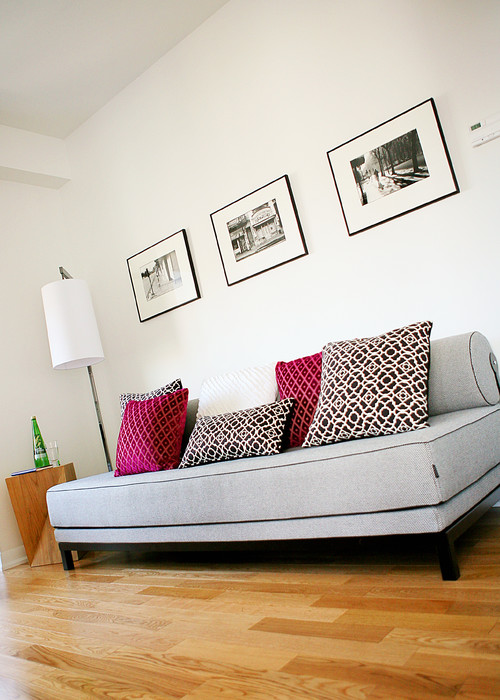 Photo by Pure Bliss Creative Design
Photo by Pure Bliss Creative Design The advantages? Sofa sleepers are usually a bit quicker and easier to set up than sofa beds. They are also often much lighter, meaning they are easier to move around and get into and out of properties. This makes them particularly popular with students.
The disadvantages? Unlike a sofa bed, a sofa sleeper doesn’t have a real mattress or a sprung bed frame, meaning that it is often not as comfortable to sleep on. Not having a proper mattress can also make it a little harder to find bedding to fit, and to make the sofa sleeper look attractive to your guests.
Summary:
Sofa bed
- ++ Comfortable
- + Easy to make up
- – Can be heavy
Sleeper Sofa
- + Easy to move around
- – Comfort dependent on the sofa cushions
- – Regular bedding may not easily fit
Sofa bed vs Daybed
What is it? A daybed is a single bed on which cushions are placed during the day so people can sit on it. Most have a backboard on one side of the bed to lean against when it is in use a sofa during the day, and some also have a pull-out section so they can be turned into a double-bed at night.

The advantages? Like a Murphy bed, a daybed doesn’t require the mattress to fold, meaning it can usually be thicker, which may make it more comfortable. They also require very little set-up to be used, since all that is generally required is to move cushions and put bedding on.
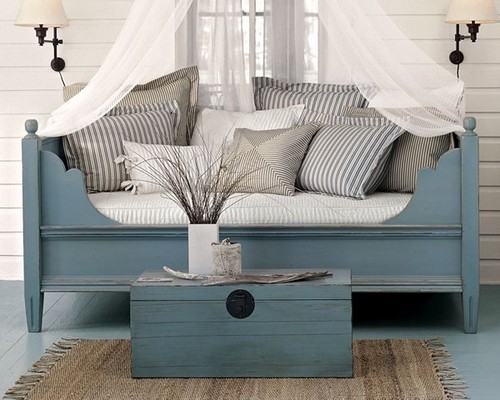
The disadvantages? While a sofa bed is a proper sofa during the day, a daybed is essentially just a bed with cushions to lean against, so it is usually less comfortable to sit on. A daybed also requires plenty of cushions, all of which have to be put somewhere when it is being used as a bed, and this can create clutter if it is in regular use.
Summary:
Sofa bed
- ++ Proper sofa during the day
- – Folding mattress may be less comfortable
Daybed
- + Can use a regular mattress
- – Not as comfortable to sit on as a sofa
- – Requires lots of cushions
Sofa bed vs Air Mattress
What is it? An air mattress is an inflatable mattress, either double or single, which can be deflated, folded up and packed away when not in use. When used as a bed, it just needs an area of floor to be inflated on and to have bedding put on it.

Image Source: dreams.co.uk
The advantages? An air mattress takes up less space when not in use than any other item on this list. It can also easily be set up in any room in your house or flat, or even taken with you on trips, making it a particularly flexible option.
The disadvantages? Even the best air beds don’t quite replicate the feeling of sleeping on a real mattress. As they get older, they can start to lose air slowly overnight, and can even be punctured if accidentally placed on a sharp object. Unlike a sofa bed, they also don’t provide any seating during the day.
Summary:
Sofa bed
- ++ Comfortable, and feels like a real bed
- + Can be used as a sofa during the day
- – Harder to move from room to room
Air mattress
- + Takes up very little space when not in use
- + Extremely portable
- – Can stop holding air as they get older
- – Risk of punctures
Sofa bed vs Futon
What is it? A futon is a soft, foldable mattress that is usually placed on a wooden slatted bed, often one which can convert from a sofa to a flatbed.

The advantages? Many people believe that futons promote a particularly good night’s sleep with their thinner mattress and plain slatted wooden base and that they are especially good for people who suffer from back pain. Their design also fits well into more minimalist properties, and even as a sofa, they tend not to take up too much space.
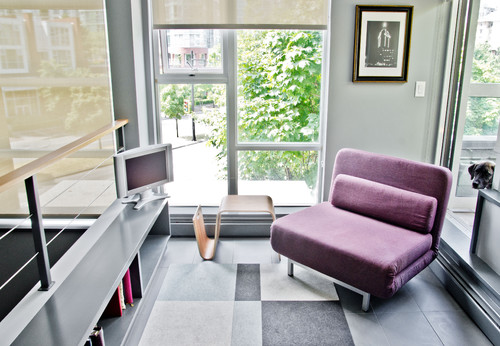
The disadvantages? Too many people used to sleep on thicker mattresses or a sprung sofa bed, a futon can be uncomfortable. They are also often less comfortable when configured as a sofa since they simply rely on the thin futon mattress folded to create padding.
Summary:
Sofa bed
- ++ Much more comfortable for those used to traditional beds
- + Comfortable as a sofa
- + Available in a wide range of designs
Futon
- + Lightweight and easy to set up
- + Good for people who prefer a harder sleeping surface
- – Often not particularly comfortable as a sofa
Conclusion
The right kind of temporary bed for you depends a lot on your circumstances of course. For those with a small studio flat who need a bed, they are going to sleep in every night, a Murphy bed can be a great option. Equally, for anyone who needs a quick and easy guest bed that can be put in a cupboard when not in use, it’s hard to beat an inflatable mattress.

Marco Corner Sofa Bed
For most people, however, the flexibility of a sofa bed makes it a perfect all-around option. They are available in such a wide range of styles that you will never have to compromise on the sofa design you wanted, yet can still easily offer guests a comfortable bed to sleep on, with the minimum of effort. And if it ends up only being used as a bed a couple of times a year? You haven’t wasted any space, and your sofa is just as comfortable to sit on as it would have been if it wasn’t a sofa bed.

Darlings of Chelsea: Jacob Sofa Bed

Darlings of Chelsea: Alexi Sofa Bed
